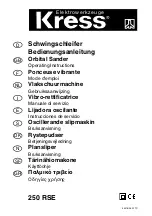
Commissioning
Introduction
The drywall sander is ideal for sanding walls and ceilings made of dry construction or plaster. The
sander offers exceptional results and is ideal for new buildings as well as renovating older buildings
faster than other common processing methods. Please clean the sander and the dust collection bag
frequently.
Operational areas
Work in a clean and well illuminated workplace. Unorganised and badly illuminated work-
places can lead to injury.
Only work with electric tools in places which are in no danger of exploding and where no flam-
mable liquids, gasses or dusts can be found. Electric tools can create sparks which can light
up a fire from dusts and gasses.
Keep children and other people away from the electric tool whilst working with it. The smallest
distraction can lead to loss of control over the tool.
The plug of the electric tool needs to match the socket. The plug may in no way be manipu -
lated. Do not use an adapter plug together with a grounded electric tool. The original plug and
the matching socket minimise the risk of an electric shock.
Avoid contact of grounded surfaces, such as pipes, heating units, stoves and cooling units.
The risk of electric shock is increased if the item is grounded.
Keep the machine away from rain and moisture. Water running into the electric tool increases
the danger of electric shock.
Do not use the cable of the electric tool to carry or hang the device up with or to pull it out of
sockets. Keep the cable away from heat, oil and sharp edges or from items with moving parts.
Damaged or knotted cables increase the possibility of electric shock.
If you work with an electric tool outdoors, only use an extension cable that is suitable to be
used outdoors. The risk of electric shock is decreased with extension cables made for out-
doors.
If using the electric tool in a humid area is unavoidable, always use a fault-current circuit
breaker to minimise the risk of electric shock.
Personal safety
Ensure that you are always stay focused on what you are doing and are careful when working
with electric tools. Never use any electric tool if you are tired or under the influence of alcohol,
drugs or medicaments. The smallest distraction or negligence can lead to serious injuries.
Always wear your personal safety equipment and also protective glasses. Wearing personal
protective equipment, such as dust masks, slip-resistant shoes, safety helmets or hearing pro-
tections (depending on the use and choice of electric tool/ machinery) reduce the risk of injury.
Avoid an unintentional activation. Ensure that the machinery is always switched off before
connecting it to an electric source and/or a battery or before carrying it. If your finger is located
on the “on” button whilst carrying it or the machinery is plugged in whilst already being
switched on, it can lead to serious injury.
Remove the adjustment tool or the spanners before switching the machinery on. Any kind of
adjustment tool/ spanner attached to a rotating part of the machinery can cause serious injur-
ies.
Avoid unnatural body postures by positioning yourself securely and holding your balance.
This will make it easier to manoeuvre the machinery when unexpected situations arise.
Always wear suitable clothing. Do not wear any loose clothing or jewellery. Keep hair, clothing
and gloves away from any moving parts. Loose clothing, jewellery or long hair can easily get
caught in moving parts.
If a dust bag can be connected, please ensure that it is connected and used adequately. The
use of a dust bag can diminish the risk arising from dust particles.
© by WilTec Wildanger Technik GmbH
Item 61857
Page 5
http://www.WilTec.de
http://www.aoyue.eu
02 2021
-1





























